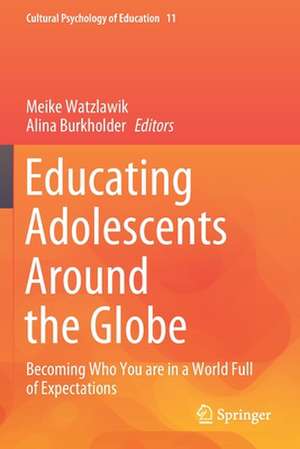Educating Adolescents Around the Globe: Becoming Who You Are in a World Full of Expectations: Cultural Psychology of Education, cartea 11
Editat de Meike Watzlawik, Alina Burkholderen Limba Engleză Paperback – 5 mai 2021
| Toate formatele și edițiile | Preț | Express |
|---|---|---|
| Paperback (1) | 642.83 lei 43-57 zile | |
| Springer International Publishing – 5 mai 2021 | 642.83 lei 43-57 zile | |
| Hardback (1) | 898.58 lei 22-36 zile | |
| Springer International Publishing – 5 mai 2020 | 898.58 lei 22-36 zile |
Din seria Cultural Psychology of Education
- 15%
 Preț: 656.89 lei
Preț: 656.89 lei - 15%
 Preț: 649.22 lei
Preț: 649.22 lei - 15%
 Preț: 639.90 lei
Preț: 639.90 lei - 15%
 Preț: 633.68 lei
Preț: 633.68 lei - 15%
 Preț: 637.59 lei
Preț: 637.59 lei -
 Preț: 422.31 lei
Preț: 422.31 lei - 15%
 Preț: 635.80 lei
Preț: 635.80 lei - 15%
 Preț: 637.78 lei
Preț: 637.78 lei - 18%
 Preț: 736.81 lei
Preț: 736.81 lei - 15%
 Preț: 583.78 lei
Preț: 583.78 lei - 18%
 Preț: 729.53 lei
Preț: 729.53 lei -
 Preț: 392.75 lei
Preț: 392.75 lei - 15%
 Preț: 649.71 lei
Preț: 649.71 lei - 15%
 Preț: 644.49 lei
Preț: 644.49 lei - 15%
 Preț: 650.37 lei
Preț: 650.37 lei
Preț: 642.83 lei
Preț vechi: 756.27 lei
-15% Nou
Puncte Express: 964
Preț estimativ în valută:
123.01€ • 128.75$ • 102.38£
123.01€ • 128.75$ • 102.38£
Carte tipărită la comandă
Livrare economică 31 martie-14 aprilie
Preluare comenzi: 021 569.72.76
Specificații
ISBN-13: 9783030379025
ISBN-10: 3030379027
Ilustrații: XIV, 326 p. 36 illus., 5 illus. in color.
Dimensiuni: 155 x 235 mm
Greutate: 0.49 kg
Ediția:1st ed. 2020
Editura: Springer International Publishing
Colecția Springer
Seria Cultural Psychology of Education
Locul publicării:Cham, Switzerland
ISBN-10: 3030379027
Ilustrații: XIV, 326 p. 36 illus., 5 illus. in color.
Dimensiuni: 155 x 235 mm
Greutate: 0.49 kg
Ediția:1st ed. 2020
Editura: Springer International Publishing
Colecția Springer
Seria Cultural Psychology of Education
Locul publicării:Cham, Switzerland
Cuprins
Part A: Adolescence from a Theoretical Perspective.- Ch.1 Adolescence - A Cultural-Sociological Perspective.- Ch.2 Adolescents Instead of Adolescence: Beyond Phases and Developmental Tasks.- Part B: A Journey to different Countries around the World.- Ch.3 Educating Adolescents in India: Challenges and A Proposed Roadmap.- Ch.4 India’s Demographic Dividend: Addressing the Challenge of Poverty in Educating Adolescents.- Ch.5 Building Blocks and Barriers to Educational Attainment and Learning in Kenyan Schools: Preserving or Changing Cultural Identity Markers.- Ch.6 Education for Street-Connected Children in Kenya: Marginalization, Challenges, and Recommendations.- Ch.7 Is It Fair? The German Education System and Its Stumbling Blocks for Adolescents.- Ch.8 Dead End Schools? Refugee Teenagers and School Segregation in Germany.- Ch.9 The Brazilian Education System: The Challenges of Inequality.- Ch.10Teaching Young Offenders in Brazil.- Ch.11 Japanese Schools and (Necessary) Educational Reforms: Challenges and Opportunities for Adolescents.- Ch.12 The Dialogical Construction of School Connectedness for Delinquent Youth.- Ch.13 Generation Calm – When Education Turns Inward.- Ch.14 Contextualised Understanding of and Transdisciplinary Approaches to School Dropout.- Part C: Learning and Intervention.- Ch.15: What Is There to Be Learned and How? Learning Through the Lens of the Self.- Ch.16 School as Intervention: A Multilayered and Culturally Embedded Concept.- Ch.17 My delinquent voice: Screaming, but so what?.- Ch.18 A Tour of Adolescent Education around the World: Lessons Learned and A Vision for the Future.
Notă biografică
Alina Burkholder has worked in international contexts throughout her career, including several roles in international education. Alina earned her B.S. in psychology from the University of Braunschweig and her M.S. in cross-cultural psychology from Osnabrück University, both in Germany. Additionally, she has conducted research at universities in New Zealand, the United States, Canada, and Japan. Through the course of her work and studies, she has consistently sought experiences to apply her theoretical knowledge of cross-cultural psychology to advance intercultural engagement, understanding, and learning. Currently, she is a Public Diplomacy Officer at the Embassy of the Federal Republic of Germany in Washington, D.C."
Dr. Meike Watzlawik is professor for developmental, cultural, and educational psychology at the Sigmund Freud University Berlin (SFU). While studying psychology at the University of Braunschweig, she was already working as a volunteer at a youth counseling center supporting adolescents and young adults (12 to 26 years of age) who were being faced with developmental challenges (e.g., low self-esteem or problems with parents and peers). In her studies on the psychology of adolescence, she examined sexual identity development (Ph.D.), sibling relationships (Habilitation) as well as identity development in general (diverse projects in several countries). Prior to her current position at SFU Berlin, she was the CEO of a private career-counseling center where she helped adolescents and young adults find the right educational or occupational path— always stressing that, despite all universalities, sight of the individual must never be lost.
Textul de pe ultima copertă
By traveling to different parts of the world, this book provides a multidisciplinary perspective on the current state of adolescent education and demonstrates how education systems are formed by and closely tied to culture. After establishing a theoretical background, the book delves into the particulars of adolescent education and its associated challenges in six countries (India, Kenya, Germany, Brazil, Japan, and Denmark). In tandem with the discussion of institutions, the stories of those who are all too often underserved or left behind are told. Despite the diversity of each education system, the investigation reveals several unifying themes that transcend the specific contexts. The lessons from each example are woven together to demonstrate how the individualized needs of students can best be met, in a vision for the future of educating adolescents."
Caracteristici
Provides a multidisciplinary perspective on the current state of adolescent education around the world Demonstrates how education systems are formed by and closely tied to culture Discusses the challenges of adolescent education in six countries by introducing different groups of underserved adolescents Ties together the lessons learned to give practical advice for working towards the goal of serving all adolescents well
